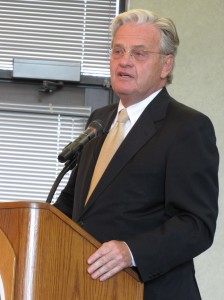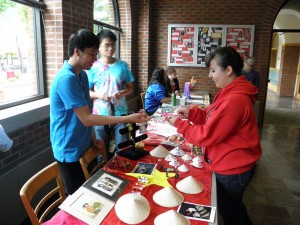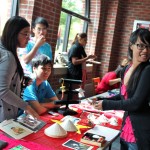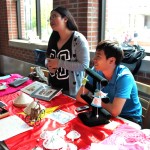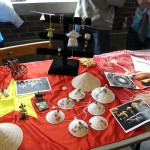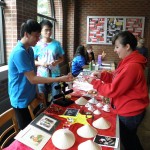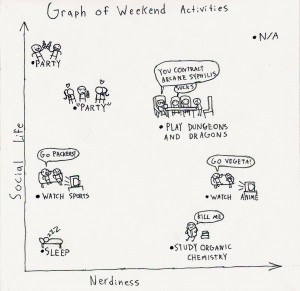By Carly Shields
Transcript Correspondent
Bryant Terry, a food activist, “eco-chef” and author, spoke in the Benes Rooms on Sept. 24 about “Food Justice at the Intersection of Food Politics, Poverty, Public Health and the Environment.”
Terry grew up in Memphis, Tenn. with a family that had the privilege of having nice food and homegrown vegetables all the time.
His grandfather had an urban farm where he grew fruit trees, vegetable plants, spices and herbs in the back yard.
But when Terry went to high school, he didn’t want to be the one kid bringing in fresh produce for lunch every day so he was peer pressured into eating fast food for every meal.
“I quickly became lethargic, overweight and had uncontrollable acne,” Terry said. “I didn’t want to have anything to do with my family.”
It was not until a friend of his showed him a song, “Beef” by Boogie Down Productions, that raps about fast food and processed meat in this country that everything changed for him.
Terry became a vegan at that point in his life and began his “life calling” of teaching people how to eat and cook healthy food.
Terry was inspired by African culture and the relationship food has with culture.
“Food is such a powerful tool to bring people together,” Terry said. “The goal of my work is unity.”
Terry focuses his food activist in urban cities and on African Americans in the U.S.
Terry is also interested in “sustainable, fair, clean food systems” and justice for farmers and the consumers.
“Look at yourself, look at what you want out of your life and embody that through your diet,” Terry said.
Terry said that about 30 percent of Americans are obese.
Terry became very attentive to food and the importance of healthy food when he realized that the younger generation would die sooner if we continue this unhealthy pattern.
“There is a stigma with those who are obese,” said Terry. “They are blamed by the media and others when a lot of (obesity) is genetics.”
A 2005 Berkeley College statistic reports that America spends one million dollars every hour on ads that sell unhealthy foods and beverages.
“38.2 million African Americans between the ages of two and 19 are obese compared to Caucasians of the same age,” Terry said. “It’s a lack of access to healthy food.”
Food deserts, which are districts that have limited access to healthy foods but instead, have access to fast food restaurants and corner stores are the villains to large rates of obesity in African American society Terry said.
In the late 1960’s in urban cities in America, affluent Caucasian Americans were fleeing from the cities to the rural areas of the country, taking super markets and health stores with them.
Corner markets, liquor stores and convenient shops served as grocery stores for those who were left behind, which were mostly African Americans.
Corner markets still remain as the dominant markets for most people living in non-affluent areas of cities today.
These markets also charge people 50 percent higher prices than super markets because of the limited access to lower prices.
Terry got his graduate degree in history at New York University and focused on black civil rights. The Black Panthers from the Civil Rights movement believed communities should be self-reliant.
As a result they fed over 10,000 people every day in cities so kids would have breakfast before going to school.
“It bothered me that there was a kind of apartheid in the food system in New York City,” Terry said. “If you lived in wealthier parts of the city, like Soho, you had opportunities to 15 different olive oils but if you lived in poorer areas of the city you had nothing.”
Terry also spoke about the importance of eco-friendly food and how to grow it.
Terry hosts a television show called “Urban Organic” where he interviews friends and teach the viewers about sustainable agriculture in urban cities.
A topic they have discussed is aquaponics, which is a sustainable way to grow food by combining aquaculture and hydroponics together by growing your produce in water tanks and getting its nutrients through the fish waste.
This sustainable way of farming does not require a lot of space and materials, making it a easy way to farm in urban cities.
Terry is also very active and interested in local farming for local communities.
He says this will increase healthy diets and decrease food deserts.
Senior Grace Wallace said Terry helped her realize how local food can combine local people’s talents to can create healthy diets and new opportunities for communities.
“Local food is important because the people can come together and implement their own skills (for example, someone who is a skilled gardener partnering up with an irrigation specialist to devise an organic garden),” Wallace said.
“The more people who combine their efforts towards a nutritious diet, the more alternatives they will have.”
Terry also started an organization called “Be Healthy” which teaches people how to cook sustainably and easily.
Terry said he found it important for college students to know how to cook when they are forced to cook on their own and how important it is to know what they eat and how much of it they eat, like processed food, sugar and fats.
“An important way we can dictate the health of our food is to cook it ourselves,” Terry said.
Terry has three cookbooks that teach people how to eat healthy by using less meat and more vegan diets.
“People have this idea that vegan and vegetarian food is bland and boring,” Terry said.
Junior Katie Buckingham changed her mind on vegan diets because of Terry’s lecture.
“I think his take on ‘vegan soul food’ is really interesting and makes healthy, vegan food much more accessible and appealing to people,” Buckingham said.
“When people are talking about healthy, clean food I normally only see thin, blond, white women, but I liked that his video featured a community garden and restaurant which was ran by people from mixed cultures.”
Terry’s cookbooks are a blend of soul food, African American food, organic food and vegan recipes.
“To reduce African American food to slave food is inaccurate,” Terry said.
“Soul food is only one part of African American’s diverse food… Foods are culturally relevant to people, that is why I put a lot of emphasis on African American cuisine.”
Not only is Terry a chef, author and show host, but he is also a food activist, who is curious and interested in the way food policies work in this country.
Terry said the country needs to be more invested in change, including farmers, community members and the consumers.
“What I find exciting are local policy changes,” Terry said.
“We need to be driven by the people who want the change, who are the local farmers and local community members.”
“They are the ones who know what’s best for local communities, not the people who come in with no ties to the community and act as if they know what’s best for them.”
“The people in the community are running the projects and their goals truly reflect what’s being done in their community,” he said.
